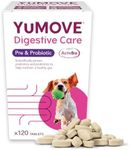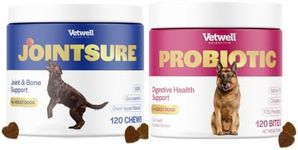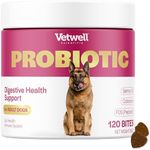Buying Guide for the Best Dog Probiotics
Choosing the right probiotics for your dog can significantly improve their digestive health, boost their immune system, and enhance their overall well-being. When selecting a probiotic, it's important to understand the key specifications and how they relate to your dog's specific needs. Here are some important factors to consider when picking the best probiotic for your furry friend.Strain DiversityProbiotics are made up of different strains of beneficial bacteria. Strain diversity refers to the variety of bacterial strains included in the probiotic. This is important because different strains offer different health benefits. For example, some strains may help with digestion, while others may boost the immune system. When choosing a probiotic, look for one with multiple strains to provide a broad range of benefits. If your dog has specific health issues, you may want to choose a probiotic with strains known to address those issues.
CFU CountCFU stands for colony-forming units, which is a measure of the number of live bacteria in the probiotic. This is important because a higher CFU count generally means more beneficial bacteria are available to support your dog's health. Probiotics can range from millions to billions of CFUs. For general maintenance, a lower CFU count may be sufficient, but for dogs with specific health issues or those recovering from illness, a higher CFU count may be more beneficial. Always consult with your veterinarian to determine the appropriate CFU count for your dog's needs.
FormulationProbiotics for dogs come in various formulations, including powders, capsules, chews, and liquids. The formulation is important because it affects how easily you can administer the probiotic to your dog. For example, powders can be mixed with food, while chews can be given as treats. Choose a formulation that fits your dog's preferences and your convenience. If your dog is picky or has difficulty taking pills, a flavored chew or liquid might be the best option.
Additional IngredientsSome probiotics include additional ingredients such as prebiotics, vitamins, and minerals. Prebiotics are fibers that feed the beneficial bacteria, helping them thrive in your dog's gut. Vitamins and minerals can provide extra health benefits. When choosing a probiotic, consider whether these additional ingredients align with your dog's health needs. For example, if your dog has a sensitive stomach, a probiotic with prebiotics might be beneficial. If your dog needs extra nutritional support, look for a probiotic with added vitamins and minerals.
Storage and Shelf LifeThe storage requirements and shelf life of a probiotic are important to ensure the bacteria remain effective. Some probiotics need to be refrigerated, while others are shelf-stable. Always check the storage instructions and choose a probiotic that fits your lifestyle. If you travel frequently or have limited refrigerator space, a shelf-stable option might be more convenient. Additionally, pay attention to the expiration date to ensure the probiotic will remain effective for the duration of its use.

















